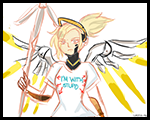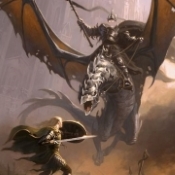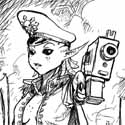|
I don't think I've ever seen described how a Navigator actually steers a ship. Sure, they may plot the course, but how is it executed? Who turns the wheel, and how do you know which direction to steer in the Warp? E: I assume "stable Warp routes" are what may allow Navigator-less travel, just "Warp out here, turn the ship 120 degree starboard, run the engines for a week, jump out"
|
|
|
|

|
| # ? Apr 26, 2024 05:51 |
|
If you go too far off track the Navigator starts to scream and bleed from all 3 eyes. When the bleeding stops you have your course.
|
|
|
|
JcDent posted:E: I assume "stable Warp routes" are what may allow Navigator-less travel, just "Warp out here, turn the ship 120 degree starboard, run the engines for a week, jump out" There are computers that can do that much for short jumps. The problem is going in and out on short jumps is very slow. This is why Chartists both take a long time, and don't take however long it would take to reach another star system going sublight. There are also computers that can do a Navigator's job perfectly, notably better than Navigators, and the houses destroy any examples they find with extreme prejudice because they know if the Imperium ever found out it had an excuse to kill all the Navigators it would. Can't really blame them.
|
|
|
|
Night10194 posted:There are computers that can do that much for short jumps. The problem is going in and out on short jumps is very slow. This is why Chartists both take a long time, and don't take however long it would take to reach another star system going sublight. Also, a computer in Hams is like one missed update away from housing daemons
|
|
|
|
JcDent posted:I don't think I've ever seen described how a Navigator actually steers a ship. Sure, they may plot the course, but how is it executed? Who turns the wheel, and how do you know which direction to steer in the Warp? Essentially when the ship translates to the Warp, the Navigator bases off their direction off of the beacon the Emperor's presence provides, using it as kind of a true north.
|
|
|
|
JcDent posted:So is Agent's Guide lying about DG or is it just bad editing/incompetence? The way the game actually feels to play is more down to the individual scenario you're running, rather than the Handler choosing whether to run an Outlaw or Program game. Just like in the original Delta Green, when the level of official cover and support you had available completely depended on the module. In Convergence the players had a high level of access and backup thanks to a well placed DG Agent in the FBI, including a secret lab tech you could send all your mysterious samples to. Meanwhile, the Delta Green organization was totally useless in Victim of the Art, their only role was to mail the players boxes of worthless information several days after they asked for it.
|
|
|
|
 Delta Green: Agent's Handbook Chapter Two: Agents In short, the new edition of Delta Green defines Agents in terms of stats, derived attributes, profession, skills, and bonds. If you've ever played DnD, the stats in this edition will be perfectly familiar. We've got a total of six, Strength (STR), Dexterity (DEX), Constitution (CON), Intelligence (INT), Power (POW), and Charisma (CHA). They range from 3 to 18, with 10 being average for an adult human. Stats are generated either with your old-school "roll 4d6 and drop the lowest die" or by taking a pool of 72 points and dividing them between the six stats on a 1-to-1 basis. Derived attributes consist of Hit Points, Willpower Points, Sanity Points, and Breaking Points. HP is exactly what you expect, WP is used for spellcasting, to resist interrogation, exhaustion, fear, and insanity, and also a few other cases. SAN is that Call of Cthulhu standard we all know and love, and the Breaking Point is the value at which SAN loss inflicts a long-term mental disorder on the character. A character's profession is used to determine their starting skills. Professions include things like Historian, Computer Scientist, Federal Agent, Special Operator, Program Manager, and so on, and each is defined by a set of skills with starting values, a selection of additional skills that the character can choose from, and a number of Bonds that the character will begin with. A later chapter in the Agent's Handbook covers a number of federal agencies and the sorts of professions each one employs, and The Complex covers even more federal agencies and private companies with government ties. Skills themselves are pretty similar to how Call of Cthulhu uses them. They're rated from 0% to 99%, and Agents also get to add 20 points to eight skills of their choice. The Agent's Handbook includes a list of (optional) packages of skills to make things easier, including things like Athlete, Veteran, and Urban Explorer. Bonds are something that's new to Delta Green, and a really great addition as far as I'm concerned. They represent the most important people in a given character's life; children, partners, parents, mentors, friends, you name it. Each Bond has a value representing its strength, and Bonds can be used to better resist trauma of all kinds, but at the risk of weakening and possibly destroying them altogether. Lastly, depending on the sort of game the Handler is running, players can choose to have their Agents be Delta Green veterans. This has a few different options that cover the sorts of messed up stuff Delta Green agents could've been subjected to, such as Extreme Violence, Captivity, Hard Experience, and Things Man Was Not Meant to Know. Each gives additional skill points and possibly even immunity to specific sources of SAN damage such as violence and helplessness, but at the cost of SAN damage and either disorders, weakened Bonds, or lowered attributes. Now for a little demonstration. Meet FBI Special Agent (and Delta Green veteran) Angela Reyes. She's a pretty well-rounded person, so to make her stat generation quicker we're going to take the "Well-Rounded" stat spread; two 13s, two 12s, and two 11s. STR 11, DEX 11, CON 12, INT 13, POW 13, CHA 12 Since she's an FBI special agent, we'll go with the Federal Agent profession, which gives her: Alertness 50%, Bureaucracy 40%, Criminology 50%, Drive 50%, Firearms 50%, Forensics 30%, HUMINT 60%, Law 30%, Persuade 50%, Search 50%, Unarmed Combat 60%; and from the list of additional skills, we'll take Accounting 60%. The Federal Agent profession also gives her three Bonds, which we'll fill in later. As for bonus skill points, we'll allocate them the old fashioned way instead of taking one of the bonus skill packages, and give her +20 in each of Bureaucracy, Criminology, Forensics, Firearms, HUMINT, Law, Persuade, and Search. Now for her Bonds. She got married back when she was still in college, and while it didn't work out for them, she's still good friends with her ex-husband. She's also close to her partner in the Bureau, even though he doesn't know anything about Delta Green. Finally, there's her best friend from high school that also went to her alma mater. Reyes starts with a value in each of her starting Bonds equal to her CHA of 12. Finally, Reyes isn't exactly new to all this. She's been on Delta Green ops before now, and on one of those ops something happened. She doesn't remember what happened, hell, she doesn't even remember most of what happened before, during, or even after the op. Coming face to face with Things Man Was Not Meant to Know and learning just a little too much gave her +10 to Unnatural and +20 to Occult, but it's left a hole in her mind. She lost 13 SAN from the experience and now suffers amnesia surrounding the event, and is prone to future episodes of amnesia if she should suffer too much SAN loss in a short amount of time. And that leaves us with with our Agent and future casualty: quote:Angela Reyes Next: The Game
|
|
|
|
Important to note, the skill list has been slimmed down significantly from Call of Cthulhu 6E (7E was in development around the same time as DG). This is one of the big quality of life improvements that the new DG system brings to the table over the original game, although I think they could have reduced the skill bloat further. A firearms guy now just needs to be good at Firearms (so no more Pistol, Rifle, Shotgun, SMG), and you no longer have to buy both Spot Hidden and Listen (just Alertness) but an Anthropologist still needs to buy Archaeology, Anthropology, History and Occult. The way the game handles languages also means that the more intellectual professions start with a lot of skill points sunk into language skills that probably won't come up over the course of the campaign. IMO the best professions are Criminal, Federal Agent, and Intelligence Case Officer, since they all give you a solid core of both investigative and kinetic abilities. That way you can spend your bonus points on whatever you want, instead of needing to shore up your core competencies.
|
|
|
|
I also think the devs knew they were going to do Deep State at some point, and spin off all the interesting stuff about how DG operates, that they kept it pretty black box to start.
|
|
|
|
SHADOWRUN 5e More Magic: Enchanting and Adepts If you want to do magic that isnít summoning, go ahead, Iím not stopping you. Enchanting covers basic magical items: binding spells into things or making magical foci, as well as identifying and disenchanting things. Itís not really that useful, but has a few handy things it can do (healing potions, saving mana on the run and having stuff happen on a trigger). The rules are basically the same as casting a spell, but you pick a Trigger that determines when the effect goes off (either on your command, on contact with a living being, or on a timer). You do set a force for enchanting the item, and the total successes are used for the duration and as a substitute for the skill used for casting. Youíve now got an object with a spell bound in it thatíll go off at some convenient time. The time limitís in hours, so youíll probably just prep a couple things before the run. Drain does look like it can be a real concern, so having some stuff banked is handy even if the check is going to limit the power of it compared to just casting it yourself. I think more experienced shadowrun people are going to be into it more, since it helps make plans more complex. Generally youíre supposed to enchant non-magical things, and the text alludes to the Object Resistance Chart, but the actual rules donít involve it at all, so go ahead with enchanting bullets or drones. Make a gun wizard, this gameís not so serious you canít pack a revolver with 6 seperate spell bullets. If youíre going rules as probably intended you unfortunately canít do this as an archer since you need to draw arrows, so you canít use a touch trigger.* Artificing is for making Heavy-Duty magical Foci that enhance magical abilities. Weíll get to them in more detail in a bit, but the main thing to know is every mage in their right mindset is going to want a couple. You can just buy them, of course, but you can craft them if you either want to save cash or get around availability. Making a Focus is pretty different from your standard spellcasting. You first need a recipe, which you can just buy, but it tends to have a specific Telesma (thing youíre enchanting) that probably isnít convenient or cool for you. Your GM is probably going to make it a bald eagle feather or some hard-to-get bullshit so just pick it yourself if you have a decent Arcana skill. This is the first point Object Resistance is in the rules, so make it something as natural as possible, like a bit of carved wood or stone. Once youíve got the object, you need a magical lodge with as much force as youíre going to be imbuing, a bunch of reagents and some time. Eventually you make a pretty chunky roll of Artificing + Magic against the formulaís strength and hopefully you pull it off, and stay conscious after the hefty hit of drain. You also need to pour in some Karma to finish it, which makes this something thatís only really going to be in long-term games. You can also disenchant other alchemies and things, if that comes up. Much cooler than alchemists are Adepts, awakened people who can channel magic into themselves to enhance their physical abilities, becoming super awesome at kung fu mostly. They run the gamut from martial artists to weird gurus, and sidestep a lot of the prejudices against magi get. Having the ability to punch a guy so hard he explodes is a useful shadowrunner skill, so a lot of them turn to crime. Adepts are super simple mechanically. You get a budget of Power Points up to your Magic, and can spend those on special powers. A lot of these replicate cyberware, including a wired reflexes equivalent that isnít horrifically invasive surgery that ruins your ability to Not Shadowrun things, but a few more give you unique upgrades like wallrunning, moving without a trace, grabbing non-bullet ranged attacks and social-focused tricks like voice mimicry and control of body language, as well as some magical abilities like astral perception and magic resistance. Itís a good way to go if you want to make a less-gear intensive street samurai with more social grace and different flavour, or an infiltrator-style character with lots of manoeuvrability and perception. If you specifically want to punch things youíre better off with robot arms, but thereís nothing stopping you from grabbing guns or a sword with this guy. I imagine a lot of people just dip into it for a couple perks, or just want something simple that doesn't take ages to figure out. Next time: The loving astral plane *you can do it with a crossbow, turns out, since they have an internal magazine system. Alternatively you can do it with a liquid inside an injection arrow/bolt Wrestlepig fucked around with this message at 01:08 on Dec 28, 2020 |
|
|
|
JcDent posted:Also, a computer in Hams is like one missed update away from housing daemons To be fair that's mostly realistic
|
|
|
|
Delta Green Shotgun Scenarios - Pt 6: Posterís Choice This will be a lightning round of Delta Green Shotgun Scenarios. One that I like from each year, excluding the winners and excluding the ones I wrote. The full short list with the rest of my picks can be found here. 2005 Last Things Last - by Bret Kramer. Cleanup after a deceased old-timer in the group. The classic that started it all. Republished in Need to Know, the quick start for the new Delta Green rules. Agents are assigned to clean up the affairs of a recently deceased (of old age) Delta Green agent, to ensure that no evidence of his illegal activities falls into the hands of law enforcement. They track the trail of evidence to his cabin in the woods, whose septic tank hides a horrifying secret.
2006 Hazardous Materials - by the Man in Black. Someone with access to the group's email server wants stolen chemicals. A MAJESTIC 12 super soldier driven insane by alien experiments steals a truck of protomatter and makes a run for it. Agents chase him down and get caught in the crossfire.
2007 Wormwood - by James Haughton and Arseny Kuznetsov. A mission to purchase and destroy Mythos documents from the Russian mob leads to unexpected complications. Delta Green Agents head to Moscow to purchase a special tome from a mysterious buyer. Itís a trap, the Agents are captured, tortured, and sent to Chernobyl by GRU SV8 (the Russian Delta Green) to track down a mysterious monster.
2008 Operation Schwarzschild by James Haughton. A self-aware spawn of Azathoth materialises inside the LHC. A mythos cult plots to subvert the inaugural activation of the Large Hadron Collider, in order to bring their God to earth in a shower of alien physics.
2009 Unit 23 - by Kinny Graham. An illegal auction of stolen artworks is rudely interrupted by the owners. A street gang rips off a stash of magic items from an even more dangerous mythos based street gang. The Agents are sent to the auction where the hoods plan to fence the take. Then the original owners of the pieces show up to take their stuff back.
2010 Drifting - By Viktor Eikman. The Drifting Classroom (1972) plugged into Delta Green. A 200 yard block of the city is flung millions of years into the future, along with the Agents and everyone else in it. Itís up to the players to survive in the blasted wasteland, and figure out how to return to the present.
2011 A Fork in Project FLIPSIDE - by Viktor Eikman. A legitimate experiment in physics, on commission by Project REDLIGHT. A secret project bankrolled by MAJESTIC to generate antimatter using alien physics.
2012 Publish or Perish by Michael Daumen. A scholar changes history by rewriting a Mayan codex. A researcher studying the Classic Maya Collapse discovers a magical codex that can alter the past, and uses it for petty personal gain. At first.
2013 Hoard -by Viktor Eikman. Incidents in and around the home of two compulsive hoarders in Pasadena. The inhabitants of a ratty old apartment building are infected with a creeping, ravenous madness by a mysterious item amid a sea of hoarded junk.
2014 First Hand Accounts - by Eric Rodriguez. Agents infiltrate a mythos self-help group. Survivors of mythos encounters have gathered to share their stories about what happened to them.
2015 Enchanted, Iím Sure - by Anthony Lee-Dudley. A dark secret lurks beneath a New Mexico boomtown. Escapees from a crashed alien prison ship in the New Mexico desert are possessing people at a newly constructed resort and spa.
2016 BESTOW by Ross Payton. Art gallery hypercube leads to alternate universes. The Agents enter a mysterious art gallery marked as suspicious by Delta Green. Inside, they must solve a fiendish puzzle to escape back to the real world.
2017 OPERATION MAGIC DRAGON - by Anthony Warren Agents must investigate a missing persons case before a lake hiding a dark secret is drained.
2018 Dreams in the Fish House - by Magnificentophat. Agents must investigate the literal disappearance of three other Agents in a spooky aquarium. A trio of acid heads have discovered a blend of LSD that plugs your mind into the dream of Great Cthulhu. Theyíve started dosing belugas at the local aquarium, so that the whales will broadcast friendly vibes to everyone.
2019 PRIVATE DECAPITATION ISN'T A BAD IDEA - by zomner. Agents investigation leads up to a death metal band, whose song is too brutal for people. The five drunken louts of the cult death metal band Annihilation Watch have recorded a special edition LP that accidentally summons a byakhee to tear off the listenerís head. Whatís worse, theyíre about to perform it at a live show, unaware of the apocalypse of metal theyíre about to unleash.
And that takes us to the present year. Tune in next post, around January 1stish, when we figure out who won the 2020 contest. mellonbread fucked around with this message at 04:20 on Dec 30, 2020 |
|
|
|
Oooh, I've actually played Last Things Last. I recognize the basic premise from the adventure I played during the previously aforementioned time I got to play DG. As I recall my character ended up dying by the hands of the horrible thing in the septic tank because we were dumb enough to open it.  I think I was against it but the other player there was for it, I remember finger guns being drawn. Also shouting about haunting them forever if I died. Cooked Auto fucked around with this message at 02:47 on Dec 28, 2020 |
|
|
|
My biggest tip for running BESTOW . Have someone totally unrelated to the game text one of your players the word BESTOW before the game rather than having the text appear in game. My Last Things Last tip, have Marlene truly offer something an agent wants. I had a player whose character was a high ranking CIA guy with a motivation to help stop Islamic Terrorism. I had her straight up offer him the name and location of every member of ISIS. She'd trade that info for freedom and man it threw a wrench into the stoic wall of "don't open the tank" players when one of them started going "But at what cost..." Elendil004 fucked around with this message at 02:53 on Dec 28, 2020 |
|
|
|
Wrestlepig posted:SHADOWRUN 5e As I understand it, Adepts often had a problem in Shadowrun that they basically were underpowered when compared to cyborgs unless you gained a lot of karma, you exclusively invested in making them do the things cyborgs couldn't do, or you juggled a weirdly counterintuitive build involving biotech augmentation, although 4e and 5e were significantly better about Adept viability.
|
|
|
|
MJ12 posted:As I understand it, Adepts often had a problem in Shadowrun that they basically were underpowered when compared to cyborgs unless you gained a lot of karma, you exclusively invested in making them do the things cyborgs couldn't do, or you juggled a weirdly counterintuitive build involving biotech augmentation, although 4e and 5e were significantly better about Adept viability. They're still probably underpowered compared to street sam since its easier to advance cash than karma, but the advantages of "I don't need to conceal any gear, I can just walk past a lot of security" and "I start with 3 levels of wireless reflexes" are a strong argument in their favor. Plus, most combat power comes from what gun you picked. You can also budget stuff out so you take a little bit of cyber/bioware and get the best of both worlds, but that's cheating.
|
|
|
|
mellonbread posted:
The thing I really like about this scenario, just like the sheep one, is that it has a Mythos entity which is basically benign. The alien guard in willing symbiosis to the old hermit, granting the guy immortality for not much in return, is another one of those cool weird touches that I feel more modern Cthulhu Mythos stuff should have - weird-but-benign mystical happenings, to counteract the menacing outsiders from beyond the stars. Having a little bit of the universe be more or less friendly enough to human existence makes the rest of it feel more dangerous, IMO, because it adds that ingredient of hope that's important to cut any sort of bleak nihilistic cosmic horror with.
|
|
|
|
mellonbread posted:Delta Green Shotgun Scenarios - Pt 6: Posterís Choice The 2007 scenario sets off a lot of my internal alarms. Railroaded capture/interrogation/torture scenarios are never, ever a good idea and are a warning flag for an abusive or powertripping GM. This is a stand-out anomaly amongst some superb other stuff, though. The LHC one in particular is amazing, especially the various ways to solve the final puzzle. I think this is the only time I've ever seen Azathoth made interesting instead of "everybody dies". The scenario with the hoarders and BESTOW are both haunting and evocative (especially the stacks of periodicals from different timelines, and the smashed bench), and if GM'd well both could be a solid demonstration of how to do horror without any combat at all.
|
|
|
|
Wrestlepig posted:They're still probably underpowered compared to street sam since its easier to advance cash than karma, but the advantages of "I don't need to conceal any gear, I can just walk past a lot of security" and "I start with 3 levels of wireless reflexes" are a strong argument in their favor. Plus, most combat power comes from what gun you picked. In my experience if an adept is around long enough to initiate then they can start getting scary but it's a long-term investment and you're also hoping the game goes on that long.
|
|
|
|
 Delta Green: Agent's Handbook Chapter Three: The Game An important thing to note about Delta Green is that skill rolls are only called for when the situation is particularly difficult, unpredictable, or failure could have serious consequences. Otherwise, the Handler just doles out clues or information based on what they feel a person with a given level in a given skill could reasonably know or figure out, or the Handler just sets a flat threshold for a given task, and anyone meeting or exceeding that skill value automatically succeeds. Skill rolls, when they do happen, are just d100 rolls versus a percentage. Bonuses or penalties can be assigned to rolls depending on the circumstances, and are either +/- 20% or rarely +/- 40%. If someone has a 0 in a skill, they just can't do it, and if they try to do something that should be possible for anyone regardless of skills, the Handler can call for a stat roll, in which case they roll d100 vs. the relevant stat x 5. Lastly, the Handler can always call for a Luck roll when things come down to pure chance (or fate), in which case there's a flat 50% chance for things to go the Agent's way, or not. Critical successes and failures are always possible for any roll. A critical success happens on a natural 01, or any success where the two dice match (11, 22, etc.) Critical failures happen on a natural 00, or any failure where (again) the two dice match. Critical successes are usually twice as good, whether that means inflicting double damage, or completing a task in half the usual time. Critical failures, on the other hand, are a little more varied, and a few possibilities are listed, mostly amounting to things like temporary stat loss from strain or burnout, minor HP or WP loss, exhaustion, confusion, pissing off NPCs, etc. Opposed tests involve both parties rolling skill tests. It's simple enough if one party succeeds and the other fails; if both parties succeed or both fail, things are a little different. Critical successes beat regular ones; beyond that, if only one person can reasonably win the contest, and if both parties pass the test, then the higher of the two rolls beats the lower, while if both parties fail, the lower roll beats the higher one and succeeds. Chases and pursuits of all kinds are treated as opposed tests using either Athletics if both parties are on foot, or other skills depending, such as Drive, Pilot, Heavy Machinery, Swim, or Ride. Coordinating multiple chasers is worth a bonus for the pursuers, and either party can use skills like Navigate or Tactics to try and get an edge over the other (forcing another opposed test). Willpower Points basically function as mental juice for Agents; if WP drops to 2 or less the Agent takes a penalty to all tests until their WP rises above 2, at if it drops to 0 then the Agent is completely incapacitated. A proper night's sleep will restore some WP, as will properly roleplaying and pursuing one of the Agent's motivations. There are two other status effects covered in this chapter. Exhaustion kicks in when a Handler thinks its appropriate, usually if an Agent has gone too long without rest, or has neglected to get any rest after losing HP or SAN. Exhaustion inflicts a penalty to all checks, and costs the Agent some WP if they keep going despite everything. Stimulants can offset the penalty, but will cost WP if the Agent keeps taking successive doses. Sleeplessness is a risk when an Agent tries to sleep for the first time after experiencing temporary insanity or gaining a disorder; the Agent must succeed at a SAN test or they snap back to wakefulness from nightmares, and fail to get any WP back from rest. Sedatives can be used for a bonus to the SAN check, but if the Agent fails despite sedatives then they also end up sick the next day and take an additional penalty to all rolls. Next: Combat
|
|
|
|
Letting people auto succeed if they have the skill at the right level is becoming industry standard, and that's a good thing. WP is reskinned MP from Call of Cthulhu, but also has some cool unique uses in Delta Green. I think those come later though, in the section about SAN and Bonds and such. In practice the rules for exhaustion and low WP are annoying due to double dipping - you take penalties from having low WP, and you lose WP from being sleepy, which then inflicts further penalties. It's the kind of thing that should just have been one mechanic instead of two separate tracks that do the same thing. The chase rules are cool, though the game isn't consistent about how all the skills are used. Sometimes you use Athletics to run around, while in the section on temp insanities running distance is based on your CON, and in the combat section you use DEX. The specific rules for tailing someone in a car are also annoying. The skill used is the lower of the Agent's Drive and Stealth scores, and only a couple professions have both of those skills. So by RAW you're just never going to succeed because you're rolling at 10 or 20%. In actual play, everyone just lets you use Drive by itself, since that's what the skill is there for.
|
|
|
|
It's worth noting that mechanically, Delta Green is based off of Mongoose Legend (formerly Mongoose RuneQuest 2), which said pretty much the same thing regarding skill rolls; giving a few examples of what a person with a given level in each skill could accomplish either with or without a roll. The most likely reason they used that as a base is that Legend was released under the OGL (yes, the one Wizards created for the release of D&D 3e), while Basic Role Playing (the base for Call of Cthulhu) was not. I do quite like Delta Green as a system - particularly with regard to how sanity works.
|
|
|
|
It is so much faster than CoC and runs so much smoother, it really is a boon how accessible they made it for new players.
|
|
|
|
DG chargen is a definite improvement over 6E. The main stumbling block I see among new players is how profession skills overwrite the base skill values, but bonus skills add to them. The DG SAN system is also an improvement, but the rules specifically for Disorder activation might actually be worse than in CoC. I'll hold off on kvetching about those until we actually get there in the review though. In fairness, 7E has some cool stuff that DG would benefit from. Pushed rolls are a neat idea, though they require some creativity from the Keeper to implement.
|
|
|
|
Dawgstar posted:In my experience if an adept is around long enough to initiate then they can start getting scary but it's a long-term investment and you're also hoping the game goes on that long. I can see that, there isn't an immediate upper limit on Adept power the same way Essence is for cyberware-heavy character. It is a big ask though, long campaigns are rare and characters are kind of fragile.
|
|
|
|
Wrestlepig posted:I can see that, there isn't an immediate upper limit on Adept power the same way Essence is for cyberware-heavy character. It is a big ask though, long campaigns are rare and characters are kind of fragile. You're not wrong at all. It's only when you start hitting the initiate level and maybe using high-grade weapon foci that I feel like a physad hits the same level as a street samurai but as you say getting there it isn't terribly common. Which is absolutely not to say that if you want to play an adept you shouldn't go with God, because who cares about being suboptimal or whatever but the two definitely don't feel like the start in the same league although depending on the edition you can get pretty close.
|
|
|
|
SHADOWRUN 5e The Astral Plane Shadowrun really loves having things that only one character can interact with, so itís got a pseudo-dimension for wizards to hang in. called the Astral Plane. This is an Ďemotionally charged photonegativeí of the physical plane, where living things cast an intangible aura and astally active entities (spirits, magical foci, dual-natured beings, the Planet. generally magic stuff) is the only tangible stuff. An astral being can just walk through a wall on the physical plane, because its not really there in the astral. Spells leave a trace when cast, which matters for investigation stuff, but it fades away after a few hours. Magicians have the ability to interact with the astral plane, either peering into it to see magic stuff, or full-on Astral projecting where your spirit leaves your body. This has a lot of advantages: You move super fast and donít care about mundane physical barriers, substitute mental stats for physical for doing astral things, and get a faster initiative track, kinda like hackers. You can only do astral-specific things or cast spells that affect the astral plane, but you can manifest kind of like a spirit and ghost, allowing you to communicate and target people with magic. Iím pretty sure you canít use physical plane specific spells, but youíve still got a lot you can do while the mundanes canít touch you, including dumping summons on them. If youíre astrally projecting, youíll be encountering astral enemies, and astral vs astral combat has its own skill and damage calculations. Thereís also Mana barriers as a limit to how much your wizard can just zip around. They block magical stuff getting through, and can exist on either the physical or astral planes (generally both). You can bust through them by destroying them, though they regenerate, and awakened characters can push through. Thereís also special rules for Astral Intersections, where astral objects get forced into or through barriers due to actions on the physical plane, like a van with a magical ward on it crashing into a lodge. This can force magical effects to shut down, which has a lot of utility for doing crazy plans. You can banish spirits, break mana barriers and tank rituals just by having a heavily enchanted rock sitting in your pocket, though itís probably to big an investment for more serious obstacles. Itís also a part of the arms race of gotchas this game encourages, so I shouldnít be pushing for it considering the gripes Iíll do in the GM section. So thatís the Astral plane! I hate it. Itís almost impossible to interact with outside of very rare player archetypes. Itís like the matrix but worse, with the matrix you have tools that can defend against it, considerations when youíre outfitting yourself, and you can always just log on yourself even if youíre limited in what you can do. The astral plane is totally isolated and if you arenít Awakened, you canít do much outside of getting really lucky with circumstance or using stuff outside of the corebook. Iím pretty sure it pops up in the metanarrative a bunch as well, with all the bug spirits and metaplanar stuff. The GM also needs to cover his rear end since it doesnít have the same obstacles as the Matrix that push you to quick, on-site invasions with a pretty solid structure in place. Youíll need to set up magical defense on everything so the Magician canít just go ďI astrally project in, scout the entire place and summon an air elementalĒ any time thereís a potential fight, and most active astral defences, like a bound spirit on patrol, just makes it a nightmare for the other players. Dual-natured guards, either awakened guard animals or a vampire/ghoul on call, are probably the best choice since the other players can respond to them as well. Ultimately Magic needs to be made more available. Next time: Mentor Spirits, Foci rules and reagents
|
|
|
|
 Delta Green: Agent's Handbook Chapter Four: Combat So! Combat. Combat is divided into turns that don't have a set length--they last for a few seconds, "or as long as it takes everyone to complete a single action." Initiative is determined simply by DEX, counting down from the highest DEX, and with characters with tied DEX scores acting simultaneously. Each character can take a single action in a turn: Aim, Attack, Called Shot, Disarm, Dodge, Escape, Fight Back, Move, Pin, Wait, or Anything Else. Aim applies a bonus to your next attack. Attack is self-explanatory. Called Shot allows you to hit a specific location with a penalty. Disarm is an unarmed attack to knock someone's weapon out of their grasp. Dodge is an opposed test to avoid harm. Escape is used to escape a pin. Fight Back is a counterattack for when you're attacked in melee or unarmed combat. Move means moving more than just a meter or two. Pin is an unarmed attack that pins down the target. Wait allows you to pass on your initiative place and instead act at any point before your next turn. Attack rolls, critical hits, and the like all work pretty much the same as skill checks described in the previous post. The main difference is in the various possible bonuses and penalties that can be applied depending on the circumstances, such as range, cover, visibility, etc. Defense rolls, on the other hand, are opposed rolls using Dodge, Melee Combat, or Unarmed Combat. They ignore initiative entirely, and when used against melee attacks, a successful opposed roll will negate all melee attacks that turn. As for ranged attacks, only Dodge can be used to defend, and it only allows a character to dive into cover if within three metres. Damage is pretty straightforward for the most part. Damage is deducted from HP, and losing more than half of your current HP stuns you until you can make a successful CON check. At 2 or less HP you pass out, and at 0 you die. Additionally, at 2 or less HP you have to make a CON check or suffer a permanent injury, which lowers a stat of the Handler's choice. First Aid can be used to restore a small amount of HP, and can even resuscitate dead characters in some cases. Medical treatment in a hospital also restores HP, and all of this is on top of gradual healing over time. There's one big damage-related change that Delta Green's made: Lethality ratings. Some weapons or attacks are considered so lethal that there's a chance anyone that gets hit will simply die outright. Attacks that have Lethality ratings use those in place of normal damage values, and Lethality ratings themselves are shown as percentages. When a human gets hit by an attack with a Lethality rating, percentile dice are rolled against the rating. If the roll is less than or equal to the attack's Lethality, the target immediately drops to 0 HP. If the roll is greater, then the two dice are added together and the total is deducted from the target's HP (which can, obviously, kill the target just as easily depending on how much HP they have.) Naturally, if the attack roll was a critical hit, then the Lethality rating of the attack gets doubled (as well as any damage that might be inflicted if the Lethality roll fails.) Attacks can also have a Kill Radius, which can represent the blast radius of an explosive, or even the spray of an automatic or burst-fired weapon. What's more, any attack with a Kill Radius can also suppress people caught by the attack; anyone targeted by an attack with a Kill Radius, even if it misses, must immediately duck for cover unless they sacrifice SAN in order to act normally; the sole exception is if they are adapted to violence, in which case they can ignore suppression without taking SAN damage. A target's protection from combat damage is rated according to one of several stages of protection. Humans are considered by default to be Exposed, and some humans or other targets could be Fragile, meaning they can die from any amount of harm regardless of the damage roll. Armored targets subtract the value of their armor from any damage they take, whether their protection comes from armor or cover; however, while armor still leaves you vulnerable to Lethality, cover reduces all Lethality rolls to failures. Huge and Transcendent targets are special cases; Lethality rolls always fail against the former, and the latter are straight up immune to physical harm. As for non-combat forms of harm: poisons and diseases have speed ratings that determine how quickly they act, and Lethality (for poisons) and damage (for diseases.) Falling does regular damage at short distances, and Lethality beyond that. Impacts have Lethality ratings, suffocation causes damage every turn with a failed CON test, fire does damage every turn, and cold does CON damage and then regular damage. I seriously appreciate how Delta Green handles combat and damage. Lethality is a great idea and I'd love to see more games use it, not to mention how the combat and damage rules manage to cover a whole lotta different situations without getting cumbersome. Next: Sanity
|
|
|
|
You can't talk about Combat and leave out the most dangerous thing in the game...Vehicles! Ramming vehicles have a Lethality rating equal to its Armor plus it's HP. So a Combat Rubber Raiding Craft is as deadly as a blast from an M-16. An APC kills ANYTHING IT RAMS unless it rolls 100.
|
|
|
|
Unarmed is a great skill because of how easy it is to grapple and disarm enemies. If you shoot someone, they might just tank it and shoot you right back (if they have armor, if you roll poorly for damage, if they have enough HP that they don't get stunned by the damage). But if you pin them, they lose a minimum of one action breaking the grapple, more if you've got good STR and Unarmed and can beat them in subsequent opposed tests. And you can technically use the Fight Back action against a ranged attack if you're close enough to physically interfere with the other guy's gun. Which means that if someone attacks you with a firearm within arm's reach, you can disarm or tackle them (provided your opposed Unarmed roll beats their Firearms) before they get a shot off. The downside to the Fighting Back system is that, because a single roll opposes all attacks in a given turn, you have to keep the results of the roll on the table for the entire turn. That's easy if you're using a virtual tabletop or online dice roller and can just reference the roll in the text chat. Not so much at a physical table where players scoop their dice back up after a roll. You can remind them not to, but by then it's too late. Lethality is a very slick and elegant mechanic for automatic weapons and explosives, but new players often struggle to grasp it. "Roll a D100, compare the percentile result to the lethality breakpoint of your weapon, then add the two dice together if the percentile result is over the breakpoint" is something that in my experience takes several repetitions to explain. Elendil004 posted:You can't talk about Combat and leave out the most dangerous thing in the game...Vehicles! Ramming vehicles have a Lethality rating equal to its Armor plus it's HP. So a Combat Rubber Raiding Craft is as deadly as a blast from an M-16. An APC kills ANYTHING IT RAMS unless it rolls 100.
|
|
|
|
  Imagine: four adventurers sitting around a fire under a night sky filled with rolling clouds and billions of stars. They feel the warmth of the campfire on their skin as they rest, sharpen their weapons, play songs, and pet their cat. Fireflies dance along the grasstop around them. But trouble brews in the distance. A pair of glowing eyes watches them from the grass on a nearby hill. A lightning storm pricks a distant mountop. A storm is coming for the adventurers.  Imagine: A wanderer in a soft coat with a generously furry lapel sits on a fallen tree stump in the forest. The ghostly image of a deer emerges from a skull on the forest floor. The wanderer and the deer spirit share a joke and laugh together. Quest is a fantasy RPG created by TC Sottek with the goal of being the most open accessible and easy to play RPG he could. Quest was inspired by super popular Actual Play podcasts like The Adventure Zone, in particular how Sottek noticed that the GMs often struggled with, ignored, rewrote, or misapplied the rules to keep play moving or to facilitate interesting stories which means that while they were all ostensibly playing D&D, they obviously weren't *playing D&D*. D&D, especially 5th Edition, is quite frankly not a game designed to facilitate the sort of fast improvisational drama and comedy that people expect from those crazy popular AP's, and often acts to foil or prevent it. So the design goals for Quest were pretty obvious: Easy to read, friendly to experience, and meant to provide the experiences people wanted that D&D or other heavy traditional fantasy games did not provide. I think it does a pretty good job of it! It's a beautifully made book with clear writing and a system that's just there enough to be interesting while not being complicated. I haven't seen much conversation about it around here, so I figured in preparation to running it I'll do a quick F&F of the game to learn it and get people interested! Next: First, we'll teach you how to play the game.
|
|
|
|
Elendil004 posted:You can't talk about Combat and leave out the most dangerous thing in the game...Vehicles! Ramming vehicles have a Lethality rating equal to its Armor plus it's HP. So a Combat Rubber Raiding Craft is as deadly as a blast from an M-16. An APC kills ANYTHING IT RAMS unless it rolls 100. There aren't that many things that I can think of that really want to get slammed by an APC at speed.
|
|
|
|
I remember this one from the TG Industry thread, or maybe it was the TG chat thread. They had a post from the designer about how he hadn't read or played many RPGs, and based the game's mechanics entirely on listening to Actual Plays. Wish I'd saved the Twitter thread.
|
|
|
|
hectorgrey posted:It's worth noting that mechanically, Delta Green is based off of Mongoose Legend (formerly Mongoose RuneQuest 2), which said pretty much the same thing regarding skill rolls; giving a few examples of what a person with a given level in each skill could accomplish either with or without a roll. The most likely reason they used that as a base is that Legend was released under the OGL (yes, the one Wizards created for the release of D&D 3e), while Basic Role Playing (the base for Call of Cthulhu) was not. ďIf itís not an usual task, you just succeed if youíre skilled at it, donít bother rollingĒ has been a rule in CoC since at least 6e. Very easy to miss, not sufficiently reinforced, but itís not exactly a radical departure from CoC to say you succeed at things without rolling if you have the right skill rating. DGRPG hews very closely to Call of Cthulhu. There are editions of Call of Cthulhu that have changed more than some of the things DTRPG changes.
|
|
|
|
mellonbread posted:I remember this one from the TG Industry thread, or maybe it was the TG chat thread. They had a post from the designer about how he hadn't read or played many RPGs, and based the game's mechanics entirely on listening to Actual Plays. Wish I'd saved the Twitter thread. That's a misunderstanding. He's not basing it off of just listening to AP's, it's that the motivation was that he wanted a system that would provide the experience you got from an AP, without having improv professionals working around D&D's.... D&Dness. He is new to RPGs, but that's more important as to him coming in, looking at the hobby, and seeing some Problems with it.
|
|
|
|
SHADOWRUN 5e Magic roundup Thereís a few remaining bits to cover in the magic section, mostly things youíll care about in between missions, but Iíve got to cover it somewhere. Reagents are little magic batteries you can use to fuel your arcane powers. They cost 25 nuyen a pop, but you can gather them yourself, either by actively searching or harvesting from magic stuff you run into. Thatís mostly going to be dead magic critters if you can spare an hour after killing one. They have a few uses, mostly as a requirement for some magic functions or replacing your magic Limit of Force with the amount of reagents spent. I canít tell if thatís a good option or not, you probably donít want to go big with Force enough for it to matter. Theyíre cheap and available enough you can just get piles of them though, so go wild with this nuyen tax for magi. Initiation is a special avenue of advancing as an awakened character, because you canít just boost the stat like normal. It takes a while to prepare, long enough to mess with Runs if youíd be keeping track, and a big pile of Karma, but it increases your maximum magic (not your actual magic score, that gets upgraded normally), lets you astrally project to Metaplanes, and get a fancy new metamagic ability, including stuff like reducing drain or dice penalties, disguising your astral presence, putting holes in area of effect spells, or make an effect a last longer. Probably not something youíd stack due to the karma cost, but most people would have something they want from there. Foci are more interesting, even if the best option is pretty obvious. Theyíre basically special gear that helps with magic stuff. We went over how to make them, but now we get to what they actually do. You can have up to your magic stat in Foci, with a max force of 5 times your magic stat, and only one focus can contribute to a roll at a time. Theyíre also addictive, but the rules say youíre fine if you keep the total force under your magic stat. Theyíre also astrally present, so sometimes you need to turn them off. Thereís 7 different categories, but 4 of them are just ďAdd the force of this to spellcasting checks under this skill or sort of magicĒ. The other three are a lot more interesting, though. >Power Foci are the most expensive in karma, but add their Force to your magic stat on basically any magic check. Any sort of full magician is going to get the best one they can, probably a level 3 one since thatís the best you can get at character creation and itís a bit of a lost investment if you replace it with a better one, since you canít double up. You might invest in artificing to make a better one early on, and ďAspected MagiciansĒ which only get one style of magic, might get a more specific focus, but just get one of these at 3 and enjoy the dice. >Qi Focus are for Adepts, and have adept powers tied into them, at a cost of four times the power points in force, so itís basically expanding your Adept Budget. These are most commonly body modifications like tattoos, because thatís the kind of people Adepts are. >Weapon Foci are a wilder option. Every level of force adds an extra dice to melee or astral combat checks, and it exists in the astral plane as well, so you can fight ghosts with it It needs to be a melee weapon, since a projectile doesnít keep the enchantment. It unfortunately doesnít boost the limit, but it makes you consistent and it helps a lot against spirits. Plus, the only self-respecting shadowrunner that doesnít want a magic katana is one who got it on a monowhip instead. Rounding up magic are Mentor Spirits, powerful beings that help you out by imbuing abilities to your character. You buy these with karma most of the time, though your GM might give you one if it makes sense, and you pick one from the list. Most of the spirits are animals, though a few are bigger nature spirits like Sea or Mountain, and a few are archetypes like the party-hard and passionate Dragonslayer. They also give similar concepts to use to reskin, which is surprising for Shadowrun. Each gives a general benefit, as well as a specific one for Adepts or Magicians, and gives a personality flaw you need to resist with a pretty easy check. Itís a neat bit of flavour, though I canít speak for the accuracy of it. Most of the disadvantages are pretty lame though, like going berserk or stuff that your GM wonít remember. And thatís magic! You could probably remove all magic from shadowrun and itíd be fine, but on the whole I think itís worth keeping, just for the weirdness it imparts. Astral stuff needs to be easier to interact with, mainly. Hackingís bad enough but black IC canít manifest as a thunderstorm you canít touch. Next time: minor rules roundup
|
|
|
|
LatwPIAT posted:ďIf itís not an usual task, you just succeed if youíre skilled at it, donít bother rollingĒ has been a rule in CoC since at least 6e. Very easy to miss, not sufficiently reinforced, but itís not exactly a radical departure from CoC to say you succeed at things without rolling if you have the right skill rating. Well poo poo, I honestly never noticed that rule in CoC 6e.
|
|
|
|
Wapole Languray posted:That's a misunderstanding. He's not basing it off of just listening to AP's, it's that the motivation was that he wanted a system that would provide the experience you got from an AP, without having improv professionals working around D&D's.... D&Dness. He is new to RPGs, but that's more important as to him coming in, looking at the hobby, and seeing some Problems with it. Found it here in the TG chat thread.
|
|
|
|
Yeah that... that reads like bullshit? No receipts just "I talked to the guy in private and he's a moron who knows nothing about our hobby trust me he definitely said this." And what bits are supposed to be credited to someone else? The core mechanic which is from *Talislanta*, a relatively obscure RPG from over a decade ago? The abilities are vaguely move-like? Abstract range bands?
|
|
|
|

|
| # ? Apr 26, 2024 05:51 |
|
I'm excited to see a more in-depth look at Quest. I skimmed the PDF and was pretty impressed with the imagery and visual design, and getting a bit more insight into the way it works mechanically would be really helpful in deciding whether to dig back into it.
|
|
|
































